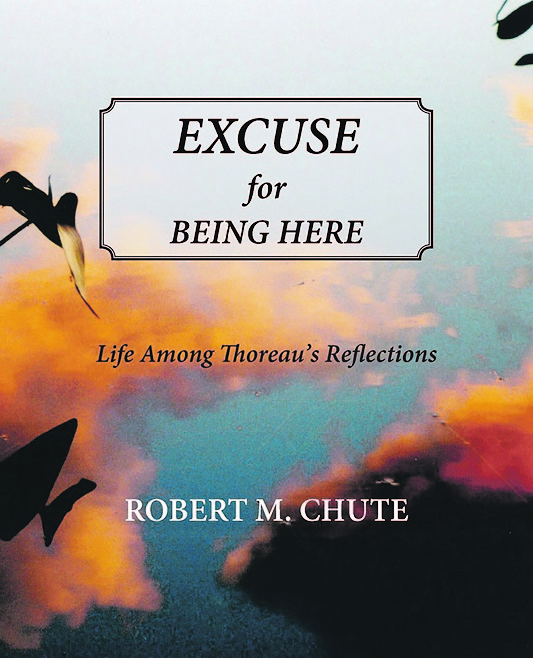“It’s magnificent, but it’s not war,” a French military attache observed after the charge of the Light Brigade. Dredged perhaps from my subconscious by current events in Crimea, it kept running through my head as I worked my way through Robert Chute’s idiosyncratic book, “Excuse for Being Here.”
Magnificent, but what is it? A collection of poems? A personal celebration of Henry David Thoreau? A memoir? It’s all of these things, and more: a bit of the commonplace book, a little transubstantiation with Chute’s hero and a gallimaufry of serendipitous connections. And for the most part, it’s highly enjoyable.
Chute is best known as one of Maine’s leading poets. He has published over a dozen collections. With titles like “Samuel Sewall Sails for Home” and “Settling In: New Marblehead, Windham, Maine, 1739-1806,” they proclaim his fascination with history. On top of this, however, he is also the author of biology textbooks. Until he retired in 1993, he “professed” biology at Bates.
Not surprisingly, then, some of his poems recall my favorite scientist/poet, Loren Eiseley.
In “Every Poet Trembles on the Verge of Science,” Chute imagines Thoreau admiring sunlight on some raindrop-laden pickerelweed, wanting “to record the scene in its isolate simplicity,” but “thoughts creep in unbidden/ as he notes: stem of Pontederia.”
Another poem, “Ant Sense,” ends: “To leave us wondering how many transistors could dance upon brains smaller than the heads of those proverbial pins.”
“Ants, of course,” writes Chute, “though not necessarily battling, show up in my work from time to time,” a connection that irresistibly brings him back to Thoreau. (I had the good fortune to hear nature writer Robert Finch discuss Thoreau’s “Battle of the Ants” from Walden, at the Stone House earlier this year.)
Sometimes Chute incorporates a quote from the Sage of Walden within his own verses (he identifies them with italics); sometimes he summarizes an entry from the “Journal,” and sometimes Chute just imagines how Thoreau might have reacted, often with particular reference to his own love of nature.
The last can also lead to quite delightful anachronisms, such as in “Henry Surfs the Web”:
“Email he exchanged with Ralph Waldo’s aunt, Mary Moody, was so funny he almost laughed out loud.”
“On the Web he found more to reject than he’d dreamed of, so much not to need, so many things not to do.”
Chute is a thorough Thoreau-phile, but that doesn’t mean he can’t have a sly dig at his hero.
The poems in “Excuse for Being Here” run the gamut from rhymes and perceivable rhythms to the freest of free verse where only the layout seems to give it poetic shape. In some, Chute plays with internal rhymes; in others, the alliterations fall fast and furious. Some of the most arresting juxtapose apparently unrelated events, such as the death of the creator of “Peanuts,” the fire-bombing of Dresden and his own birthday.
Chute has a wonderfully eclectic (and to me, wonderfully sympathetic) range of references. Here’s his take on Henry David waiting for a loon to surface: “We’ve seen the movie in several versions:/ U-boat captain below, destroyer captain above.”
In “The Skating Party,” a memory of seeing Raeburn’s sublime painting “The Reverend Walker Skating on Duddington Loch” “came skating in/ without the scritch of steel on ice.” The Rev then joins a lovely sketch on the Concord River with Thoreau (“doing some fancy, Bacchic leaps”), Hawthorne (“stiff, reserved with such even, efficient strokes”) and Emerson (“pitching forward, as if falling in a fall suspended”).
The book’s title comes, as one would expect, from a quote from Thoreau’s journal. The complete sentence is reproduced on the title page, and it is an unfortunate presage of things to come that it is misprinted: “so it seems to me that men should snow[sic] some excuse for being here.” The text is littered with typos, (as in “snow” for “show”), and just plain errors (Mark Van Doren is consistently misspelled).
Such inaccuracies are all the more confusing because of the author’s easy style as he navigates from poem to poem. Is one’s title really “Genus Is Inspired by Its Own Words?” I would have thought he meant “Genius,” but maybe I am missing some biological allusion.
Such sloppiness is too often the fate of books that are self-published. Robert Chute’s poems are too good and his anthology/celebration/memoir is too original for such slapdash treatment. Here’s hoping a major publisher picks up this book and gives it the attention it deserves.
Thomas Urquhart is a freelance writer and author of “For the Beauty of the Earth.”
Send questions/comments to the editors.



Success. Please wait for the page to reload. If the page does not reload within 5 seconds, please refresh the page.
Enter your email and password to access comments.
Hi, to comment on stories you must . This profile is in addition to your subscription and website login.
Already have a commenting profile? .
Invalid username/password.
Please check your email to confirm and complete your registration.
Only subscribers are eligible to post comments. Please subscribe or login first for digital access. Here’s why.
Use the form below to reset your password. When you've submitted your account email, we will send an email with a reset code.